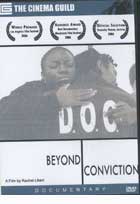
Beyond Conviction 2006
Distributed by Cinema Guild, 115 West 30th Street, Suite 800, New York, NY 10001; 212-685-6242
Produced by Rachel Libert, Jedd Wider & Todd Wider
Directed by Rachel Libert
DVD, color, 97 min.
College - Adult
Crime, Criminal Justice, Law, Rehabilitation, Social Work
Date Entered: 11/08/2007
Reviewed by Maureen Puffer-Rothenberg, Valdosta State University, Valdosta, GAIn 1998, Pennsylvania began arranging mediated meetings between victims of severe violent crimes and their perpetrators. Beyond Conviction profiles three cases where victims have asked for mediation.
Early in the film Dr. Howard Zehr and Lorraine Stutzman Amstutz briefly explain “restorative justice,” which focuses on how people—including offenders-- have been hurt by crime. Restorative justice looks for ways to repair psychological damage, in contrast to justice within the legal system, which determines which laws have been broken and metes out punishment.
The program focuses in turn on each pairing of victim and perpetrator, and closes with comments from all participants. Lyndy, 34, confronts her brother Tim, serving a prison term for raping her when she was twenty; Leatrice, whose son was killed in jail, meets Shawn, who is serving a life sentence for that murder but claims he is innocent; and 21-year-old Angela confronts Angelo, for whom she was named, seventeen years after he killed her mother. The meetings are highly emotional and include graphic descriptions of murder and rape. Libert focuses closely on her subjects’ faces, capturing a range of emotions as victims and perpetrators move from outbursts and recriminations to amiable chatting, sometimes even joking with each other. The inmates show varying degrees of remorse and concern for their victims, who hope the meetings will free them to move emotionally forward from the crime.
In post-mediation interviews victims say the meetings have released them from longstanding fears, giving them a turning point to move on from. Inmates say they have experienced emotions that they should have felt earlier but could not, and they are glad to have made a difference to someone.
Beyond Conviction’s subject matter is appropriate for college students and adults. The film is highly recommended to academic libraries supporting criminal justice programs or training programs supporting rehabilitation or victim advocacy.